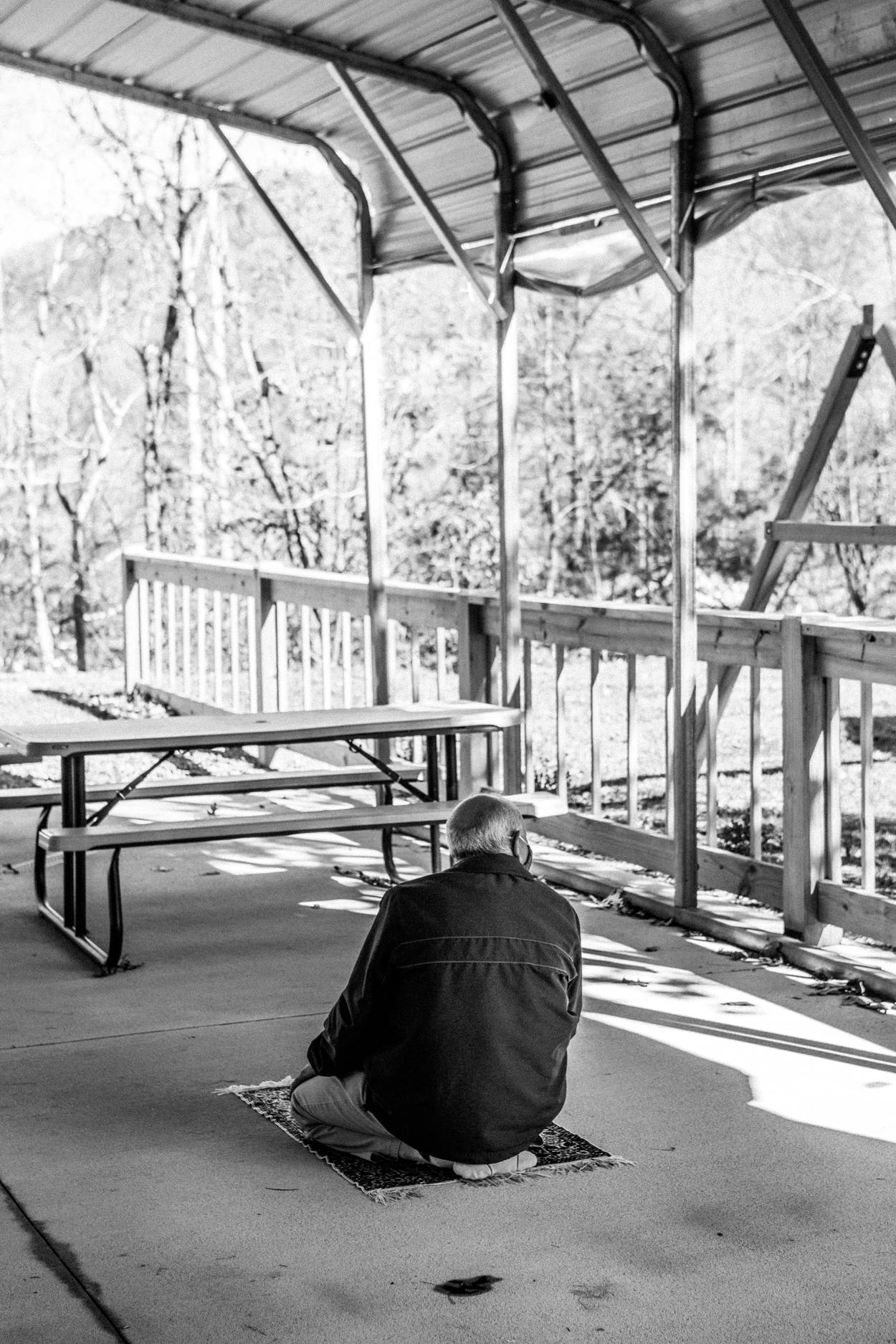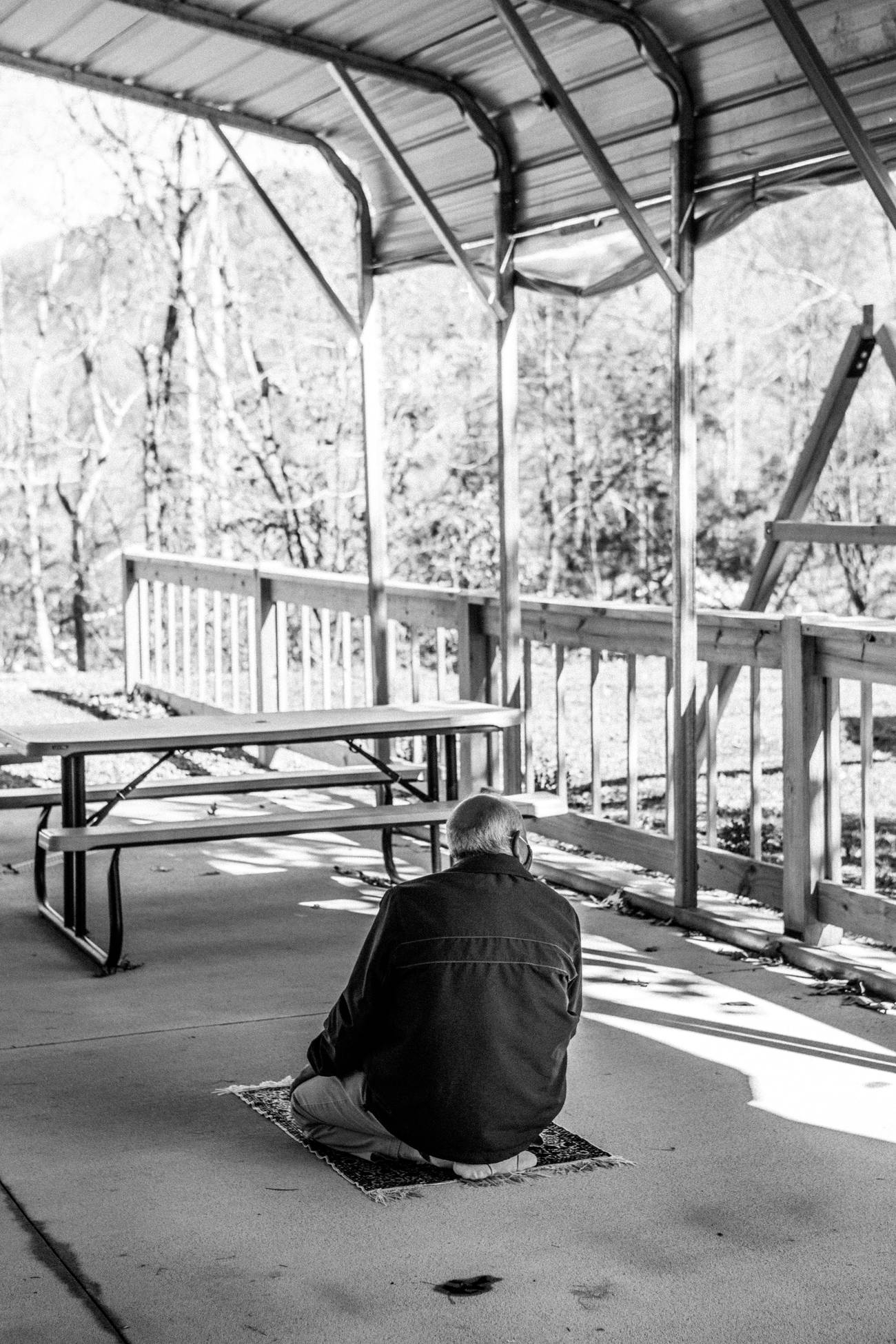Afghans in Asheville
In North Carolina’s Blue Ridge Mountains, Muslim refugees from Afghanistan find a place to feel safe—and to pray




The small congregation at the Islamic Center of Asheville has nearly doubled in size in the past several months. The newcomers are Afghan refugees who’ve been welcomed since the U.S. withdrawal from Afghanistan in August 2021. The federal government, various towns and cities, faith communities, and nonprofits have scrambled to provide for the new arrivals, and they’ve also been helped by an interfaith network of social and caseworkers and volunteers, with schools and businesses doing their best to accommodate them. However, practical concerns on the ground make day-to-day life in their new country challenging for the refugees, and an ambiguous future looms before them.
Located in North Carolina’s Blue Ridge Mountains, Asheville is a progressive island surrounded by bright red, Trump-voting counties. It may not seem like an intuitive place to send Afghan refugees, and yet there they are—42 of them, according to Catholic Charities Diocese of Charlotte program director Sandy Buck. They arrive with a one-time stipend of $1,225 each from the federal government (“all they get for the rest of their life,” she said), which is typically put toward rent, and then supplemented by donations from community and faith organizations.
Buck said that to do resettlement work, the American government partners with nine nongovernmental agencies, which left them with a short list of places to send the refugees and evacuees who arrived in the U.S. from Afghanistan last summer. Among those agencies is the U.S. Council of Catholic Bishops, which since 1975 has held various agreements with the federal government to assist with refugee resettlement. As an affiliate of the U.S. Council of Catholic Bishops, Catholic Charities offices around the country carry out resettlement work. Buck said that although refugee resettlement is usually done with an eye toward placing clients somewhere with a community that shares their cultural background, with the Afghanistan withdrawal, the priority was simply to find any affiliate that would accept them. “They needed to go somewhere,” Buck said. “They just had to get them off these military bases and safe.”
CCDOC refugee resettlement case coordinator Noele Aabye, who works with Afghan evacuees in Asheville, said it was a Catholic Charities volunteer—a Muslim from Pakistan—who initially helped connect her agency with the Islamic Center of Asheville. He “had that lived experience of coming to the U.S. and having to learn a whole new way of life, and so had a lot of empathy for people coming in,” Aabye said. Once they figured out when the Islamic Center held Friday prayers, she said, her agency was able to “put together a crew of volunteers with CCDOC to coordinate picking up everyone and getting them to Friday prayers and back.” She said the Islamic Center has served as a bridge, linking CCDOC with volunteers and providing emotional and material support to the evacuees.
Now, a few months later, a variety of community organizations and churches from other denominations assist with Afghan refugees. Aabye said help from churches includes assistance with groceries, medical appointments, and laundry, as well as church vans providing transportation, which is crucial since Asheville lacks robust public transportation. She said community support ranges from schools providing halal foods and prayer space, to a landlord who made sure the house where some Afghans are staying indicates the direction of Mecca.
One Friday in late February before prayers, I met with a large extended family of Dari-speaking Afghan refugees over tea and Oreos. Members included two parents, their five children, and a few nephews whose parents are still in Afghanistan. Aabye said they are the only intact family to arrive in Asheville. We waited as Aabye worked through a service to get through on her personal phone to a translator, whom she would put on speaker. The translator could be coming in from anywhere, Aabye said: London, Texas, Canada. She said many remote interpreters work from home, so occasionally during our conversation there was indistinct silence, noise, or conversation on the other end of the phone while we waited for the interpreter to provide translation.
The family patriarch, whose name is being withheld out of concerns for the safety of family that remains in Afghanistan, spoke of two culture shocks: the change that occurred upon leaving Afghanistan for the U.S., followed by the changes from leaving the military camp and beginning life outside the gates. When I asked about the spiritual support he and his family receive from attending Friday prayers at the Islamic Center, he told me that even though they cannot understand the English parts of the service, the prayers are the same everywhere. As to whether his children will maintain the Muslim faith they brought over from Afghanistan, he said as far as he is concerned, it is their choice now. “They are in freedom,” he said. “They do the way they want to live. But in Afghanistan, no, it is not. This is up to them. They can choose, they can do anything. They are Muslim at the moment, and they are following their religion, but it is their decision and their life, and they’ve got this freedom to do whatever they want to do.” Through the translator, he expressed confidence that they will stay with their religion, but noted that in the end, they will decide for themselves. They are Muslim, he said, and under American law, they are free to follow their religion here without outside pressure. In America, his children are free to choose Islam.
Soon, a van from a local Episcopal church arrived to take the family to Friday prayers. The Islamic Center of Asheville is a small, unadorned building at the top of a hill. Off to the side, a cheerful, wooden playground looks out at the city of Asheville and its tree-covered mountains. On this warm, bright, late-winter day, the sun was shining overhead with a welcome promise of spring.
Timothy Garrett, the khateeb (pastor) at the Islamic Center of Asheville, said the congregation already included over 100 families, and since the arrival of the Afghans, they have added an additional 60, which “pretty much double[s] us.” (Buck said there is another agency doing resettlement in Asheville in addition to CCDOC.) He described the Afghans as “collecting in small pockets,” which he said doesn’t trouble him, since in his view, “it helps them integrate a lot easier when they can do it together.”
Friday prayers provide a crucial lifeline, spiritually and literally. “There are so many families stuck in so many different places, it’s really hard,” said Garrett. “So it’s really awesome that [community volunteers] are bringing them here on Fridays so we can see the same faces and shake the same hands.” Friday prayer attendance, he said, helps the Islamic Center “gauge who’s here, who’s not, so we can selectively say, ‘Let’s go visit these people, we haven’t seen them in two weeks.’ If you see people who are absent, you go and make sure that they’re OK.”
A new leader for the Islamic Center is arriving from Jordan soon, who will establish regular evening classes of Quran study, something Garrett said is typical in Muslim communities, with focused classes on things like character, child rearing, and family life. Garrett said he hopes the Islamic Center will see even more of the refugees as their English improves, and in time he hopes that the Afghans who speak English will help out as translators so that other refugees can take part. In the meantime, the Afghan family I met with said that while they can understand the prayers, the Islamic Center is not much of a social outlet, since the Afghans and the other congregants cannot understand each other.
This language barrier is particularly difficult, Garrett said, given that there are many different languages and dialects in Afghanistan. But the refugees’ situation may change soon. Buck said community colleges and volunteers have been helping with English language instruction. Aabye said English classes are held Monday through Thursday, with Fridays being a day off.
For all the accommodations, meals, and calls from local businesses with employment offers described to me by Charlotte diocese staff, uncertainty still characterizes the existence of Afghan evacuees in Asheville. “Life is very difficult in Afghanistan,” the Afghan father said. “Very, very difficult. All the relatives and family that we have there, they are suffering. There is no food, there is no medical. But us, we came to this country, we are safe, we have got bread, food, clothes, and that is actually very difficult for us, to see that we have got everything, and they haven’t got anything.”
Living with this kind of survivor guilt, the Afghans who began arriving in Asheville in December have no choice but to press on. The family I visited has children in school, and although they acknowledge the language aspect has been difficult, they said the teachers and other students have been welcoming, and there is a “lovely” atmosphere. A young man with whom I spoke was expecting to find out in a few days where he would be working, and was excited, even without knowing for sure where he would be or what he would be doing. “I was always at home and I don’t like to be at home,” he said.
Nevertheless, in some ways, said Garrett, “their problems are just starting, they’re not resolved.” The Afghans who arrived in Asheville are predominantly evacuees, which means they are in the country under humanitarian parole status, and CCDOC staff are working to help them to apply for asylum. In the meantime, Garrett said, “they don’t know how long they’re going to have their home.”
Garrett is not a pessimist, though. “If people practice Islam properly, the good will start to overpower the evil,” he said. When asked what he would like Americans to know about the Afghans he serves at the Islamic Center of Asheville, he said, “Wherever we come from, we’re people, and people have a right to be loved and to be supported wherever they come from. We didn’t choose where we were born, we didn’t choose who our parents were, most of us didn’t get to choose what our religion was. So you have to look at people and find the person in it, and learn to love the person for who they are and spiritually, what we try to do is just present them with an opportunity to better themselves. The beautiful thing about the Prophet Muhammad, may Allah’s peace and blessings be upon him, is he didn’t care where you were when he met you, he just said, ‘Come on let’s go here, let’s get better. Not calling you bad, but whatever you are, let’s get better.’ And that’s the way of a true believing person. No matter who comes at them or why they came at them, you say hey, let’s see what we can do. Let’s find the truth, and follow it.”
This story is part of a series Tablet is publishing to promote religious literacy across different religious communities, supported by a grant from the Arthur Vining Davis Foundations.
Maggie Phillips is a freelance writer and former Tablet Journalism Fellow.